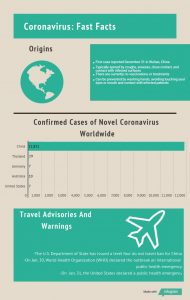
Ohio University Prepares Community For Coronavirus
By: Caitlin Hunt
Posted on:
Ohio University is providing resources to keep its students and the Athens community informed about the coronavirus.
On Jan. 28, the university launched a health alert page to educate the community with basic facts of the virus. The launch comes after Miami University announced two possible cases of the coronavirus on its campus. These cases were found to be negative.
Given the circumstances, Maggie Kahler, a second-year Public Health Administration student, said it was important that the university communicated with students, faculty, and community members.
“I think it’s important to keep students aware and send out emails with information, especially just what they can do to prevent themselves from sickness themselves and what to do if they are sick,” she said.
The Novel Coronavirus
According to the World Health Organization, coronaviruses are a family of viruses with effects ranging from a common cold to more severe illnesses. These viruses can be transmitted from animals to humans.
Health Organizations and professionals are most concerned with the novel coronavirus. The Centers for Disease Control said this strain of the virus was first detected in Wuhan, China, and is linked to animal markets. The symptoms vary, but include fever, shortness of breath, and a cough.
Kahler said her professors are using the virus as a teaching moment and telling the students that some are susceptible than others.
“It is a risk to someone who is immunodeficient like per se an elderly person, infants, or people [who] have underlying illnesses that would make them immunodeficient,” Kahler said.
Health officials still have a lot to learn about the virus including how the disease is transmitted. According to the CDC, transmission can occur within six feet of contact and spreads when an infected person coughs or sneezes. But, the CDC has reported cases where the disease spread even when the infected individual did not have symptoms.
As of now, there is no vaccine available and Kahler predicts the development of a vaccination could take some time.
“It would be hard to get it out to people very quickly because it takes many years to test a vaccine and do clinical studies to make sure it’s okay to give out to people,” she said.
Travel restrictions and the virus in China
WHO has reported eight positive cases of the virus in the U.S. – significantly lower than the over 14,000 cases in China. However, the U.S. government is still taking precautions. On Thursday, Department of State issued a level four: do not travel advisory. The department also advised Americans in China to leave immediately. Following the travel ban, Health and Human Services Secretary Alex M. Azar II declared a public health emergency in response to the outbreak.
“While this virus poses a serious public health threat, the risk to the American public remains low at this time, and we are working to keep this risk low,” Azar said.
This travel ban has made life difficult for Americans planning to travel outside the country or are currently abroad. But, Ling Xin, a second-year journalism grad student at Ohio University, said this measure is necessary and should remain until WHO has lifted the emergency status for the novel coronavirus.
Xin has family in Beijing, who has been on her mind daily since the outbreak began, but said she has faith in the Chinese government to keep the virus under control.
“In the past few days, I have been really [worried] about my family back in Beijing because we can see every day that the cases are increasing by at least 1,000 and that’s really worrying,” she said. “I know the municipal and provincial governments in China are taking really strict and harsh measurements to quarantine.”
Considering the uncertainty of the transmission of the virus, the health community is asking everyone to take health precautions. This includes washing your hands, keeping infected surfaces clean, avoiding those who are sick, and staying home when you are sick.
In China, Xin said her family is prepared to stay at home and are taking safety measures.
“I asked my mom how much food there was in the fridge, and my mom said that was totally fine that she has over 10 days reserved of food. She can wear a mask to go downstairs to get grocery as well,” Xin said. “I think they give 14 days of isolating yourself from any dangerous or possible situation to contract the virus, and then it will be much better. So, we just need to wait until the worst part is over.”
Wearing masks and staying home could easily create inconveniences in day to day life, but Xin said the precautionary measures had not dampened her family’s spirits.
“I think they are more optimistic than I am because they know what the situation is like and I don’t,” Xin said. “I read [the] news every day to figure out what the situation is like over there.”
Could novel coronavirus come to Athens?
While the number of reported cases are low in the U.S., citizens are still worried about contracting the virus. Xin said she was not concerned about the virus coming to Athens because of the lack of travel outlets.
“Here in Athens, I feel relatively safe,” Xin said. “The simplest way to explain is that Athens does not have an airport here, so we don’t need to worry about if there’s travels from China to land here directly.”
Still, Kahler said she could see why Athens’ community members are concerned about contracting the virus.
“I think comparatively what makes it hard in a rural area rather than a city is just the access to care and access to medical care,” Kahler said. “And the best thing to keep safe is just to take precautions when you hear about it and before you start developing symptoms of any kind. Just like staying ahead of it and knowing what your resources are, and where you can go for care.”
On the health alerts page, Ohio University provides students and faculty with resources, like where they can get medical attention in case of infection.
Staying informed
Coverage of the coronavirus has made headlines across the nation. Kahler said it’s important everyone stays calm during this time.
“As far as the coronavirus goes, I wouldn’t bring it up to be something more than what it is,” Kahler said. “As usual, you want to take the normal precautions of washing your hands, taking care of yourself, resting, staying hydrated, just avoiding spreading germs.”
In terms of the media, Xin said the coverage of the outbreak is essential.
“I think people just need to get the facts and calm down,” Xin said.


